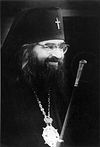

| Previous day | Next day |
| Old Style
September 29
|
Tuesday |
New Style
October 12
|
| 17th Week after Pentecost. Tone 7. | No fast.
|
![]() St. Cyriacus the Hermit, of Palestine (556).
St. Cyriacus the Hermit, of Palestine (556).
Martyrs Dada, Gabdelas, and Casdoe, of Persia (4th c.). St. Theophanes the Merciful, of Gaza. St. Cyprian, abbot, of Ustiug (Vologda) (1276). St. Onuphrius the Wonderworker, of Gareji, Georgia (1733). Uncovering of the relics of St. John (Maximovitch), archbishop of Shanghai and San Francisco (1993). Synaxis of the Saints of Poltava.
New Hieromartyr John (Pommer), archbishop of Riga (Latvia) (1934).
Holy Martyr Gudelia of Persia (4th c.). 80 Holy Martyrs of Byzantium (364- 378). St. Ludwin (Leudwinus), bishop of Trier (713). Martyrs Tryphon, Trophimus, and Dorymedon, and 150 Martyrs, in Palestine.
Repose of Blessed Anthony Alexeyevich, fool-for-Christ, of Zadonsk (1851), and Archimandrite Gerasim (Schmaltz) of Alaska (1969).
Thoughts for Each Day of the Year
According to the Daily Church Readings from the Word of God
By St. Theophan the Recluse

Tuesday. [Phil. 1:8-14; Luke 5:12-16]
The leper fell down before the Lord and besought: Lord, if thou wilt, thou canst make me clean. The Lord said: I will: be thou clean. And immediately the leprosy departed from him. So does every moral leprosy immediately depart as soon as one falls down before the Lord with faith, repentance, and confession—it truly departs and loses any power over him. Why does the leprosy sometimes return again? For the same reason that bodily diseases return. One who has recovered is told, “do not eat that, do not drink this, do not go there.” If he does not obey, the disease again flares up. So it is in the spiritual life. One must be sober, vigilant, and pray—then the disease of sin will not return. If you are not attentive toward yourself, if you allow yourself to see, hear, say, and do everything indiscriminately, how can sin not flare up and take power once again? The Lord charged the leper to fulfil all according to the law. This means that upon confession one must receive a penance and faithfully fulfil it; within it is concealed great preventive strength. But why do some say: this sinful habit has overcome me, I cannot handle myself. Either because repentance and confession were not complete, or because after making precautionary changes he adheres only weakly to them, or indulges himself. He wants to do everything without toil and self-coercion, and is laughed at by the enemy. Resolve to stand unto death and show [this resolve] in deed, and you will see what power there is in this. It is true that in every insurmountable passion that comes up the enemy possesses the soul, but this is no justification; for he immediately flees as soon as you produce an inner change, with God’s help.
Friday. [Phil. 1:27-2:4; Luke 6:17-23]
The Lord blesses the poor, those who hunger and weep, and the persecuted under the condition that it is all for the sake of the Son of Man; this means that He blesses a life which is surrounded by every kind of need and deprivation. According to this saying, pleasures, ease, honour are not something good; this is the way it is indeed. But while a person rests in these things, he does not realize this. Only when he frees himself from their spell does he see that they are not the good, but only phantoms. A soul cannot do without consolations, but they are not of the senses; it cannot do without treasures, but they are not in gold and silver, not in luxurious houses and clothes, not in this external fullness; it cannot get by without honor, but it lies not in human servility. There are other pleasures, there is other ease, other honour—spiritual, akin to the soul. He who finds them does not want the external ones; not only does he not want them, but he scorns and hates them because they block off the spiritual, do not allow one to see it, they keep a soul in darkness, drunkenness, and phantoms. This is why such people prefer with all their soul poverty, sorrow and obscurity, feeling good within them, like behind some safe fence against the spell of the deceptions of the world. What about those people who have all these things without trying? They should relate to all of these things, according to the word of the holy Apostle, as one who possesses not (cf. 1Cor. 7:30).
Articles
 Opening of the Relics, and Glorification of St. John MaximovitchArchpriest Peter Perekrestov"He is incorrupt! His relics are incorrupt!" |












